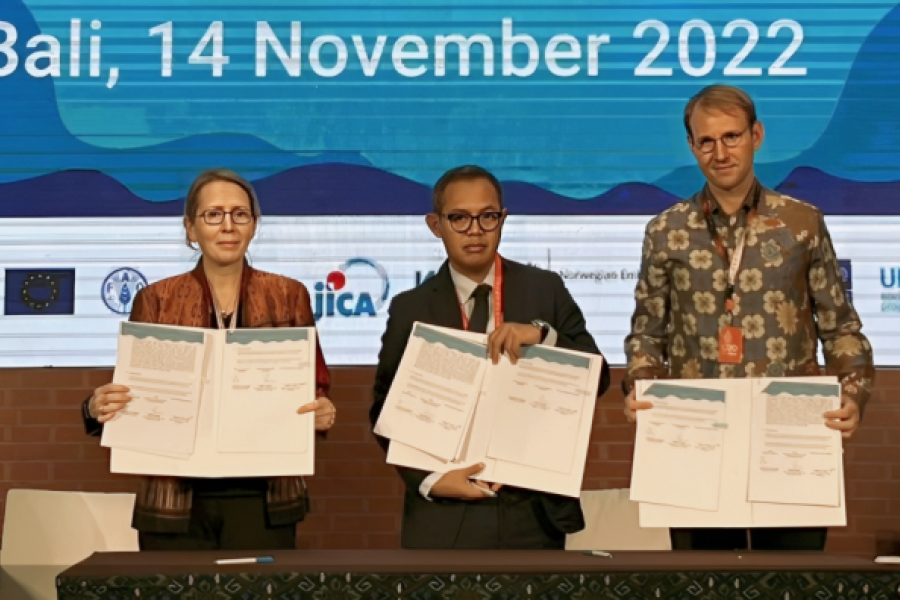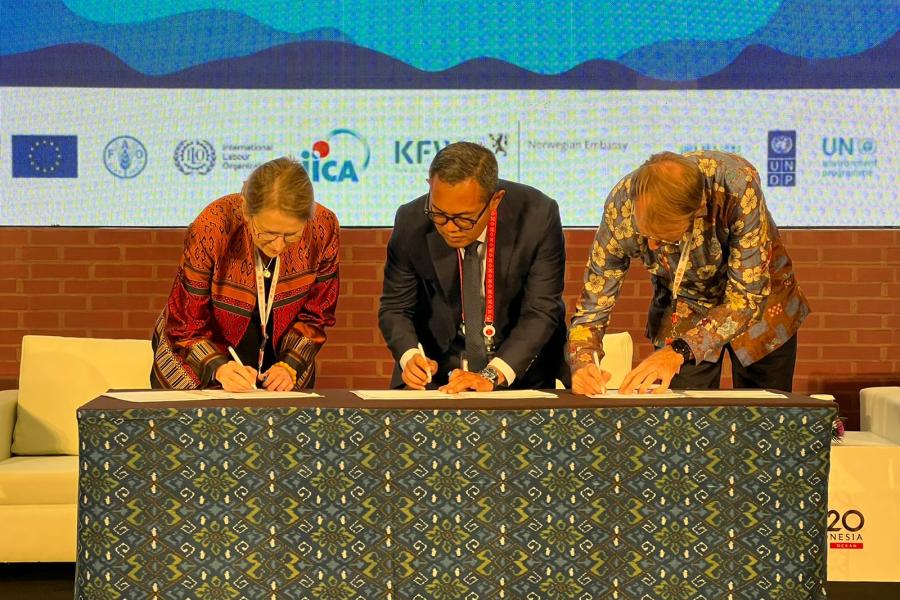UN, Government of Indonesia launch National Blue Agenda Actions Partnership for sustainable ocean development
14 November 2022
---

Nusa Dua, 14 November 2022 - Indonesia has moved an important step closer to achieving its goals under the 2030 Agenda for Sustainable Development with the signing of the National Blue Agenda Actions Partnership in Nusa Dua, Bali, today. Under this new, comprehensive partnership, eight United Nations agencies and several international development partners will support the Government of Indonesia in the sustainable development of the ocean. The partnership was signed on the margins of the 17th G20 Leaders’ Summit.
The Coordinating Minister of Maritime Affairs and Investment of Indonesia (Marvest), Luhut B Pandjaitan, stated that building a sustainable blue economy is vital for Indonesia as it helps boost revenues from ocean-based activities while conserving marine biodiversity and the health of the ocean through the restoration of marine ecosystems and protection measures as well as sustainable use. “The launch of this partnership provides an opportunity for Indonesia to unlock concrete actions and collaboration for bringing social, economic and environmental change within the maritime sector,” he said at the occasion of the launch. “It will help us recover better, and recover stronger, with a focus on the interest of future generations.”
The Resident Coordinator for the UN in Indonesia, Valerie Julliand, highlighted the complementarities between the various partners in support of the shared goal of sustainable ocean development. “UN agencies and development partners are sharing their experience, expertise and innovative approaches, and are running projects complementing those of the Indonesian government in order to accelerate the blue agenda,” she said.
The world at large is only now realizing the dire straight of the ocean, due to an unsustainable exploitation of marine resources and the dumping of waste into the high seas globally. The 2022 UN Oceans Conference in Lisbon earlier this year highlighted the plight of the ocean, which will also take centre stage at the UN Biodiversity Conference in Montreal in December, where countries are expected to make commitments towards more sustainable ocean use.
Indonesia, the largest archipelago nation in the world, is setting an example with its balanced, long-term approach for ocean development, said Peter Thomson, the UN Secretary General’s Special Envoy for the Ocean. “The world is watching, and together we can make a difference!”

The Partnership will focus on the marine and maritime sectors, ensuring a healthy environment and contributing to prosperity under four pillars: blue health, blue food, blue innovation and blue finance.
Here is how the eight UN organizations will contribute to the partnership.
The Food and Agriculture Organization of the United Nations (FAO) is working with various stakeholders to support sustainable fisheries and aquaculture management to enrich marine and inland biodiversity and habitat health.
The International Labor Organization (ILO) is supporting the government in developing programmes that provide workers in coastal communities with labour protection and the necessary skills in the maritime sector such as shipbuilding, international logistics and seafaring.
The United Nations Development Programme (UNDP) is helping to ensure the necessary investment is available for the blue agenda by supporting the government with the development of a Blue Financing Strategy and on the potential issuance of a Blue Bond/Sukuk to finance ocean-related initiatives.
The UN Environment Programme (UNEP) is working with Indonesia in the development of its Master Plan for the Blue Economy, and also supports efforts to combat marine pollution, with a focus on both land-based and sea-based sources, monitoring and enabling conditions.
UNESCO's Intergovernmental Oceanographic Commission supports scientific research, data sampling and capacity building to help Indonesian experts better understand ocean-related risks and opportunities. It also contributes to improved coastal community preparedness and response to tsunamis, to minimize their impacts and build resilient communities.
UN Women is partnering with companies working with women in coastal areas to promote economic empowerment and support skills development through the implementation of Women’s Empowerment Principles.
The UN Industrial Development Organization (UNIDO) is supporting thousands of small- and medium-sized enterprises in the fishery sector to comply with international standards and quality requirements, including sustainability. This improves market access and leads to higher incomes.
The UN’s Office for Project Services (UNOPS) is working to combat plastic pollution through supporting the member countries of the Association of Southeast Asian Nations (ASEAN) in developing and strengthening policies and regulatory frameworks that reduce plastic production and consumption, increase recycling rates and minimize leakages from landfills.
With the agreement signed, the parties will now move quickly to implementation, said Jamshed M. Kazi, Country Representative of UN Women.
“This partnership is fully ‘made in Indonesia’, by the very actors who are active in their respective areas on the sustainable development of the ocean. This guarantees that we can hit the ground running and convert swiftly the ideas we discussed here today into action.”



